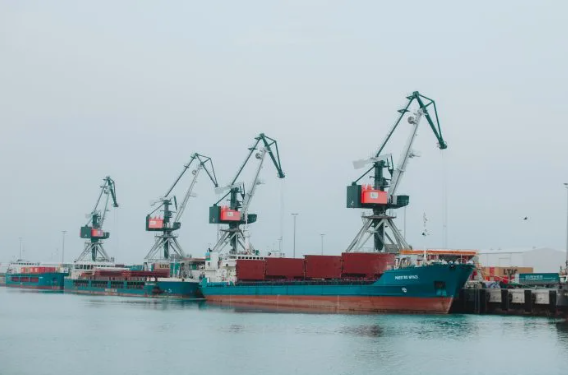Protecting the Caspian Sea is critical. As the UN’s annual climate conference (COP29) approaches, the gradual drop of the Caspian Sea’s water level is a serious issue that needs collective action, Port of Baku Director-General Dr. Taleh Ziyadov said.
The Caspian Sea, the world’s largest inland body of water, is shared by Azerbaijan, Kazakhstan, Iran, Russia, and Turkmenistan. Ziyadov emphasized that the Caspian Sea plays a key role in the economies of all littoral states, supporting industries such as trade, fishing, agriculture, and tourism.
Located in Alat, 70 kilometers south of Baku, the Port of Baku is the region’s first green port certified by the European Sea Ports Organization (ESPO). As it expands to meet global trade demands, the port aims to set an example for other regional ports by adopting green policies and prioritizing sustainability. “Our goal is to create a five-star hub connecting East and West, North and South,” Ziyadov told NE Global in a recent interview in Azerbaijan’s capital.
“Obviously, what is happening to the Caspian Sea is very close to our heart because we are based here. The Caspian Sea is integral to our operations. With the Port entering the second phase of its expansion, we have developed a strategic plan that considers climate-related risks and outlines mechanisms to address them,” Ziyadov said. “Over the last five years, we’ve observed a one-meter decline in sea level at our port, though it has since stabilized.”
He noted that Caspian Sea level fluctuations have historically been a chronic regional challenge, now intensified by climate change, demanding proactive measures. “The Caspian’s health is crucial for global biodiversity and economic growth, making its protection a shared responsibility,” Ziyadov emphasized. “In September, we joined the UN Ocean Stewardship Coalition and signed a Joint Statement from Maritime Industry Leaders to advocate for carbon neutrality and climate action. Through collaboration, we are optimistic these challenges can be managed, ensuring a sustainable future for the Caspian and its communities.”
“Our current depth is about seven meters, and even with a recent one-meter drop, we still have six meters, which is sufficient for most vessels with drafts of around five meters,” Ziyadov explained. “If the sea level drops further, we can adapt with incremental dredging, but a more significant decline could impact our berthing facilities, necessitating additional measures. This underscores the importance of proactive strategies and ongoing monitoring to maintain operational resilience.”
No single state can address the Caspian’s shrinkage
The decline in Caspian Sea water levels is a critical issue recognized at the highest levels in Azerbaijan, Ziyadov noted. “Shifts in the sea level are not within the control of any single state, nor can one nation alone reverse this trend,” he emphasized, pointing out that Russia’s Volga river, a major water supplier to the Caspian, is itself facing significant drops due to the drying of smaller tributary rivers that feed it.
Ziyadov further explained that recent studies indicate a shift in regional wind patterns—from the humid and relatively colder Northern winds to drier, hotter Eastern winds originating from Central Asia—resulting in increased temperatures over the Caspian Sea. This rise in temperature accelerates evaporation and may account for the recent sharp drop in sea levels. “This is a clear impact of global climate change,” he stated. “Addressing it requires a coordinated, collective response to prevent further decline.”
New COP 29 Initiative planned
The Director General of the Port of Baku highlighted an initiative planned for COP29: establishing a Caspian Center for Climate and Resilience. This center will address critical issues concerning the Caspian Basin’s environment, biodiversity, and overall ecological health. “There is global attention on regions like the Amazon Basin, but little focus on the Caspian Basin, which impacts millions of people and several countries,” he said. “Our aim is to inaugurate this center during COP29.”
Ziyadov also announced plans to propose a marine and port-focused panel in collaboration with the United Nations’ Maritime Division and the International Association of Ports and Harbors (IAPH). “This panel will concentrate on enhancing port resilience amid a changing climate,” he added, underscoring the importance of preparing ports to adapt to environmental challenges.
Azerbaijan aspires to create a ‘5-Star’ green trade hub
Adjacent to the new Port of Baku, the Alat Free Economic Zone was established under the leadership of Azerbaijan’s President Ilham Aliyev. This zone provides high-standard international legislation and unique free trade opportunities, bolstering Azerbaijan’s economic vision.
Ziyadov highlighted that the Port of Baku and Alat play a central role in the country’s strategy to attract and grow export-driven, value-added, and manufacturing activities. He noted that the area also includes a former military airport, situated approximately 12 kilometers from the port, which has been transformed into a cargo airport by the Silk Way Group. In the longer term, plans aim to develop a green city within the zone, furthering Azerbaijan’s commitment to sustainability.
“When we discuss establishing a trade and logistics hub in this region, it is naturally connected to the Middle Corridor,” Ziyadov explained. “But the real question is how these trade routes and transit connections will contribute to Azerbaijan’s economic diversification beyond oil. As a relatively small country, transit alone isn’t enough to serve as a standalone diversification strategy. Azerbaijan has never solely aimed to be a transit country; rather, transit serves as a stepping stone toward our larger vision of becoming Central Eurasia’s primary hub.”
Port of Baku aims to lead as the first green port in the region
Ziyadov emphasized that the Port of Baku’s mission is to lead as the first green port in the region. “We’re focusing on sustainable practices, aiming to shift to electric tugboats and installing solar panels on rooftops. During COP29, we plan to sign an agreement for solar energy that will allow the port to source its electricity needs through solar power,” he added.
“We’re also exploring the potential of hydrogen,” Ziyadov stated, “but in our region, it’s still in the early stages of development. We’re closely monitoring advancements in Kazakhstan, particularly in the Mangystau region, where German investors are actively examining hydrogen production opportunities. This will undoubtedly open new pathways for hydrogen transportation and its application as an energy source, whether in shipping or in port operations—such as for cranes, vehicles, or forklifts.”
He added, “Whether hydrogen will become the primary fuel source or if green methanol will take the lead remains uncertain. I believe the coming years will provide clarity on the direction we’ll pursue.”
ALAT Economic Zone lures renewable energy manufacturers
Regarding renewables, AFEZ Chairman Valeh Alasgarov told NE Global in Baku that there is a lot of interest in the ALAT Economic Zone from renewable energy companies that wish to produce wind turbines and blades and solar panels within AFEZ, as well as to build renewable energy power stations.
The production of wind towers and blades will be advantageous in AFEZ, as it will allow to avoid high transportation costs and shipping difficulties. “The main problem is time and cost of transportation, for example, of wind blades and towers from China or from Europe. If we want to speed up this process because time is money, of course, it would be better to establish production of wind farms, solar panels and energy storages in the ALAT Economic Zone using our privileges, our incentives and our location at the crossroad of international transport corridors in the vicinity of Baku International Sea Trade Port,” Alasgarov said. He noted this would allow for more cost-effective electricity production. “It means this electricity will be more competitive at surrounding markets,” he said.

Alasgarov said he was confident that Azerbaijan would be able to export electricity via a project to build a Green Energy Corridor to Europe. “It’s not enough to have resources, it’s not enough to have ambition, it’s very important to have experience,” he argued. “Azerbaijan has experience in resolving such problems. And if the President of Azerbaijan announced, ‘We will export electricity to Europe,’ it will be resolved. Tomorrow everyone will be part of this project. When we started, for example, the Baku-Tbilisi-Ceyhan project who believed that everybody in the Caspian region would try to use this pipeline? But in reality, we opened doors and the same will happen with green energy,” the AFEZ Chairman argued, adding, “Azerbaijan will be the initiator, and Azerbaijan will implement this project, and will open doors for everyone in the region. Resources, ambitions and successful experience, it’s very important.”







